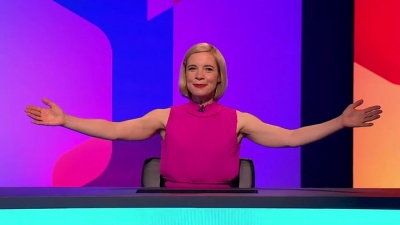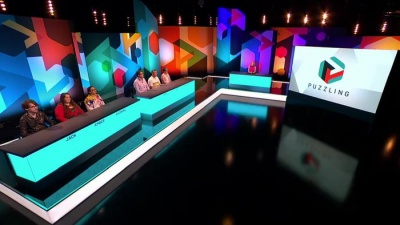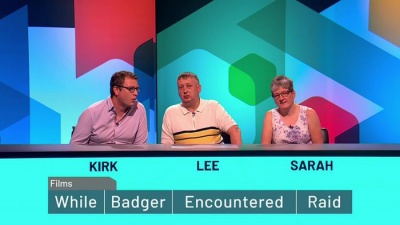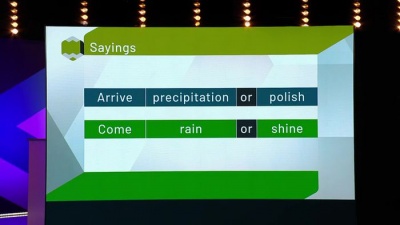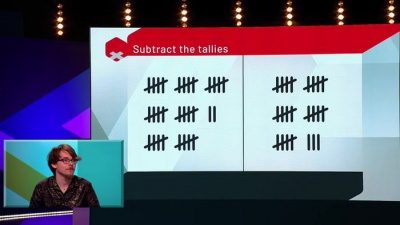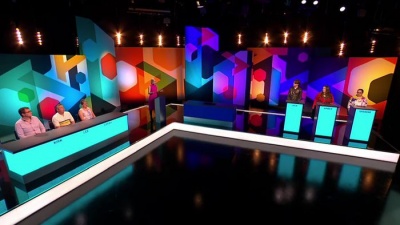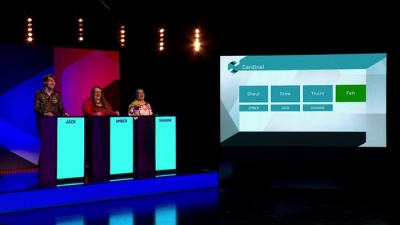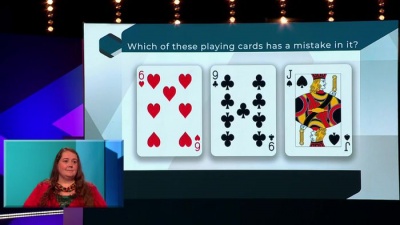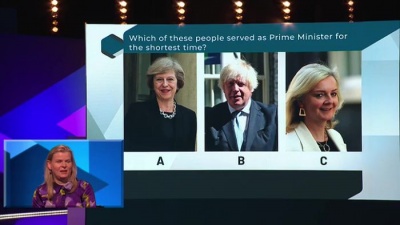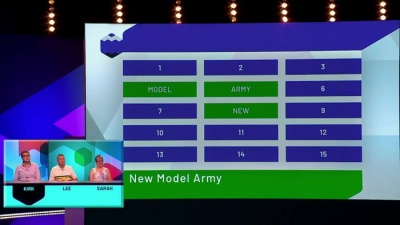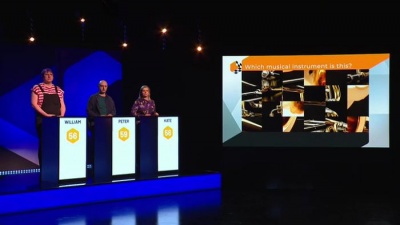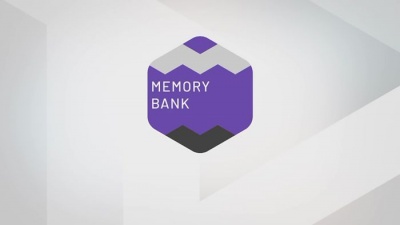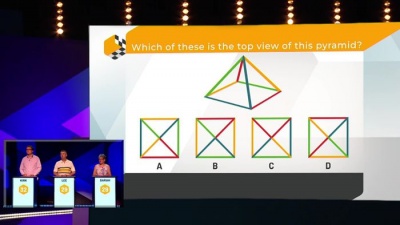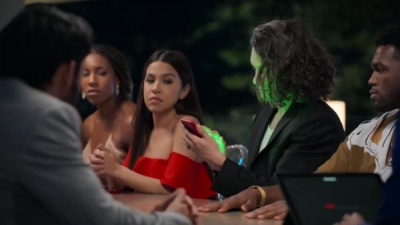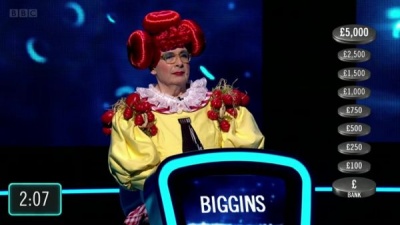Weaver's Week 2023-07-16
Last week | Weaver's Week Index | Next week
Can we review Puzzling on its own terms, without mentioning how it is Channel 5's attempt to "do" Only Connect? No, we cannot.
Contents |
Puzzling
12 Yard and Wheelhouse for Channel 5, from 22 June
Television quiz history is littered with shows obviously inspired by other programmes. BBC2's successful nostalgia quiz Today's the Day inspired Channel 4's vaguely similar Backdate. The success of Who Wants to be a Millionaire brought about lots of big money quizzes, of which Greed was the least bad. The Weakest Link made "nasty" a format point, and that was all the excuse we needed in the aughts to be sadistic to contestants.
The biggest weekly quiz of the moment is BBC2's Only Connect (2). Around for fifteen years, The OC has spawned remarkably few copycats. If we squint enough, we might find a vague link to ITV's successful The 1% Club; questions that address how you think more than what you know, and a host who is snarky and positive at the same time. But Puzzling is a more direct competitor, borrowing many leitmotifs from OC. Even the title sequence is familiar, fast-moving CGI images while a loud neo-baroque theme tune plays.
Host for the programme is Lucy Worsley, a well-educated blonde woman, just like on the other side. By day, Lucy is a head curator at the royal palaces. By night, she invites six strangers into her chambers and has fun with them. "Fun" in the sense of "test every area of the players' brains", and not "fun" as in Channel 5's launch mission of "films, football, and funning". (It took about six series for Victoria Coren Mitchell to develop her Only Connect character, the first series was mostly played straight.)
Six people are arranged in two teams of three. Unlike other shows, they've applied as individuals, and only met as a team in the green room before filming. "What do you have in common?" asks the host after the players have introduced themselves, setting up a couple of points of difference already. The biggest point of difference comes in the final round, where the winning team turns on each other. But more of that later. Eventually, we're puzzling. It's three-and-a-half minutes from the start of the show to the first question, and that does feel like an eternity.
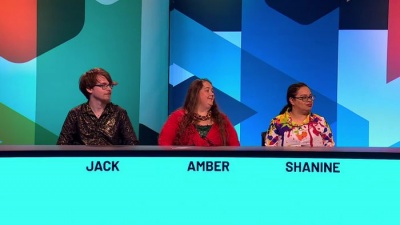 A sample team: some questions will appear in the space beneath their name, just like on other shows.
A sample team: some questions will appear in the space beneath their name, just like on other shows.
In Other Words is the first round. "For each puzzle, you'll be given a category and some words. You must find a synonym for each of the highlighted words to uncover a famous title, name, or phrase." An example clarifies the situation. They've begun the show with a painfully long rules spiel, thirty seconds of the show during which we weren't puzzling. Two points for a correct answer, one point if it's offered across for a bonus. Five puzzles for each team, played alternately.
How does this work? You know that round on House of Games where they give synonyms for a song's lyrics, and get the players to identify the song behind "Aqua WC! Was unable to remove myself, had been my desire!". You know that round? Exactly what they're doing here, except they're not going for "Waterloo" but short phrases. "Piffling Chase" becomes "Trivial Pursuit", "While Badger Encountered Raid" turns into "When Harry Met Sally" – not that the team understood why.
Each question is shown on screen while it's being considered – usually as a strap beneath the conferring players, occasionally on the big screen. Scores only appear at the end of each round, the contestant names are on screen almost all the time.
Pressure Points comes next. It's a test of calculations. Players see two similar images, and an instruction, which should lead to a number. This is a timed event, the player on the left starts, and will keep playing until they get a question right. Two points for the team for a correct answer, one point off for an error or a pass. They do not keep individual scores. The question in play when time expires just dies, no points gained or lost.
Again, the questions are shown on the big screen. Just one contestant plays, so it's simple to keep them in a small box in the corner. Contestants must have been asked to talk through their working, so we hear "Five and four is nine, and five is fourteen... divided by three, six, twenty-four divided by six, four!"
Mental arithmetic is rarely compelling television, and this round is no exception. The Krypton Factor made an effort to get its contestants adding up and taking away and multiplying. 1000 Heartbeats had Pinpoint, perform operations on arrangements of numbers on coloured backgrounds. Both of those were reasonably fast-moving; Pressure Points tends to be slow and ponderous.
And perhaps that is a deliberate choice. Throughout the round of Pressure Points, one thing is missing. Figures. Digits. None of the questions use the familiar Arabic numerals – there are tallies and dice spots, but symbols 1234567890 are all given the round off. It's a brave choice, and may be rather clever – a lot of people are put off by numbers, cross about multiplication, go to pieces with division. Conquer the fear by not actually using numbers? Brave move.
After the break, we see one team standing at individual podia. They're about to play Rule Breakers. A clue and four answers appear on the screen. Individually, the team are to select the answer that breaks a rule. One point for each player who gets the odd one out, and there's a further point if the team can identify what is the rule being broken. Questions don't go to the other team.
Puzzling uses an unfussy sans-serif typeface. It's lovely to look at, easy to read, but this round presents a problem. The letters are a bit small and thin, which doesn't help when the "big screen" occupies about a quarter of the actual screen. The contrast between white letters and teal box is not particularly strong, especially when our eyes are dominated by the beige background behind the teal. Not all viewers are watching on massive sets the size of your front door; some are looking at arm-sized screens in poor lighting, and this round can be almost impossible to follow.
Quite clearly, this round is an homage to Only Connect, via an alternative universe where it's Only Disconnect. And the round is an homage to Paul Daniels' 1980s quiz Odd One Out, where the idea was to spot the interloper in a group of four. It's also an homage to the producer's ability to draw something out as long as is possible – they manage to make ten questions last a quarter of an hour on screen, with plenty of conferring and explanation of where the players went wrong.
Not something we'd normally do, but we must note that Lucy Worsley does not pronounce the emphasised "r" consonants, they come out as a "wuh" sound. This is an observation, not a criticism of Lucy, not an aspersion on her ability to present the show. We do look over our glasses at the scriptwriters, who come up with "Britain's Brightest Brains" and "Rule-breakers", phrases to emphasise the host's diction. It's as if they wrote the script to trip up Jonathan Ross.
Anyway. Everyone is back at their desk for the third part of the show. Lucy says that the teams face each other; this literally isn't correct, as everyone is sat in a long line facing the big screen. For a show that's meant to be about precision, this is a bit imprecise.
Picture This. A recording studio somewhere far, far away, where six people have their visual intelligence tested. "Every picture puzzle has a question attached to it." It's another timed round – two points for a right answer, and play passes to the next person. One point away for an error, and play stays with you.
There are some common question styles in this round. What is the time in the mirror, by which they mean "Here is an analogue clock face, reflected vertically in a mirror. What time is it showing unreflected?" There are rebuses, like in the final round of ITV's daytime quiz Riddiculous. There are merged faces, using photo editing skills almost as bad as this column's, and Shifted Letters – a word or phrase has been moved about in the alphabet.
Outlines of countries, and details missing from national flags or keyboards, and spot the deliberate mistake questions snaffled from The 1% Club. Which number does not have a reversed counterpart in the grid feels like another 1% Club question, but we don't think they've used it – yet? There are missing sections from pictures, missing letters or words from spirals, and occasional general knowledge questions. Find the name located at a time on the clock – that's a direct lift from Timekeepers, a BBC1 daytime quiz of blessed memory. (Can we find an episode to review? Leave it with us...)
This round moves at a very decent pace, each team will get around a dozen little stumpers. And we can play along at home, as they're displayed in the big bit of the screen.
Memory Bank is the final competitive round. The teams are shown 15 words, and then given clues that can be solved with one or more of the words. Buzz in with the correct number(s), and it's one point per word; an error costs a point but the question won't be thrown over. So, for instance, if the answer is "Hotel", you say "1". Don't need to say "1 Hotel" like on Winning Lines' Wonderwall, just the number.
Whichever team has the fewer points at the end of this round is the night's losers, and those three players leave with our thanks and nothing more. The winning team go back to the individual podia from earlier on and play Divide & Conquer. It covers everything the players have seen tonight – singonyms, sums, the many sorts of visual puzzles, and back to the memory bank to name some of the words from their number. Odd ones out seem to have nipped out to the bar, and aren't in this round.
For reasons that might make sense at the end of the series, each member of the winning team starts with the number of points they'd scored in the main game. One point for a correct answer, one away for an error – and the erring player is also wallied out of the next question. In the first episode, they displayed puzzles in this round on the inset screen; thanks to feedback on social media, they have re-edited to put the puzzle much bigger on screen. Let us play along, we want to play along – or at least see why the answer is right.
The round ends after about three minutes, but quite possibly at the producer's convenience to avoid a tie. Only the winning contender will come back for the semi-finals, and we're not entirely sure how that will work – some sort of seeding based on the score?
Puzzling through the Channel 5 schedules
At the moment, Channel 5 is going through one of its regular pushes upmarket: it's using its position high in the EPG to draw in older viewers, more upmarket viewers. It's investing in some high-profile and high-quality drama The channel is good at spotting niches. It has pop culture documentaries like The Unforgettable Kenneth Williams and The Heatwave of '22. There are shows about the royals like William and Harry and Lucy Worsley's Secrets of the Royal Palaces.
Channel 5 also airs a lot of light factual entertainment – Jersey & Guernsey at the jumper and raincoat makers, A Country Life for Half the Price. There's star power in Susan Calman's Day Out and a nod to consumer affairs like Solar Panels: Will They Save Me Money?. The channel also seizes hold of some current events and milks them for all they're worth – the opening episode of Puzzling was delayed by 15 minutes so Channel 5 could give yet another update on some rich people whose submersible was found on the ocean bed. On the other channels, 8pm Thursday is dull documentary Tonight on ITV, lean-back programmes on Channel 4, there's a gap for Channel 5 to try Quizzy Thursday.
Puzzling is very much a show of two halves. The introductions, synonyms, sums, odd ones out – these all go at a snail's pace, leaving our brain freewheeling and hoping for something more. Later rounds come and go in a flash, the pace really picks up from the start of part three. How much of this is a deliberate choice? Did Channel 5 specifically say they wanted to lure viewers in with a sedate first half and then burst through with an explosive end? It would be a choice, and not the worst they've made.
Taken as a whole, Puzzling asks about 80 questions in the 47-minute show; that's about 40% of the speed of all-quiz programme 100%, and two-thirds as much quiz as Popmaster from last week. Half of the quiz comes in the final two segments of the programme, which can last as little as 15 minutes. So there's a satisfying amount of quiz in the whole, but we still think that "Rule Breakers" moves too slowly.
And the rounds themselves are a tad unoriginal – of the five main games, only the maths of "Pressure Points" is a new presentation, and we fear they've not yet found the balance between "make an accessible maths question without displaying figures" with "make the contestants count things".
On the upside, the winner of each episode – and surely of the series – will have to prove their worth in some very different challenges. This column, for instance, is aceing the general knowledge questions, we're OK at singonyms, but struggle at the memory stuff in the round called... exactly. We're also impressed with how Puzzling is foregrounding women and LGBTQIA+ folk: it would be easy to stuff a show like this with cis white men who have studied English at Cambridge, and the producers have done well not to cast too many of them.
So far, it's two and a bit cheers for Puzzling. The balance of the show isn't quite right, the show hasn't yet found its voice, and we don't know what the final round is all about. But the format is basically sound, Lucy Worsley has turned out to be a wholly competent host, and the programme celebrates diversity and concentrates on what the competitors can do rather than on what they cannot.
We must remember that it took a number of series for Only Connect to find its style. Series 2 built on series 1, and series 3 was better still, and so on. It's totally unfair to expect Puzzling to find its feet straight from the off. To make a serviceable, fair, and suitably difficult quiz is an achievement in itself. Series link set, and we look forward to reporting on the winner in a couple of months' time.
In other news
Where is Bodø? Listen to Loreen, and go up, up, up, up, up. It's a brisk 1680km walk from Malmö, which is why the EBU's allowing three months to make the walk, Bodø will host next year's Eurovision Young Musicians contest, in the Stormen concert hall. 17 August is the date, and the contest will be part of Bodø's turn as European City of Culture. See what you could have had, Coventry?
Emmy awards, the American equivalent to our BAFTA Television awards, are voted by the television industry. Nominations in the main categories with lots of game shows are as follows:
- Reality Competition Program (sic): The Amazing Race, RuPaul's Drag Race, Survivor, Top Chef, The Voice of NBC
- Host for a Reality or Competition Program (sic): Queer Eye, Nailed It!, Top Chef, Baking It, RuPaul's Drag Race
- Game Show: Family Feud, Jeopardy!, The Price is Right, That's My Jam, Wheel of Fortune
- Host of a Game Show: Mayim Bialik for Jeopardy!, Steve Harvey for Family Feud, Ken Jennings for Jeopardy!, Keke Palmer for Password, Pat Sajak for Wheel of Fortune.
There are also some specialist categories, for technical achievements like "Cinematography" and "Choreography" and "Sound Mixing". Most of those go to some combination of The Amazing Race, RuPaul's Drag Race, Pop Idol, and The Voice of NBC. It appears that Emmy voters confine their votes to a very small number of shows: do they only see a handful of programmes?
The most egregious miss: Sam Watts' music for The Traitors, which was one of the best television soundtracks bar none. And absolutely no nominations for The Mole on Netflix, which was summed up by one producer as "Players try to find the saboteur. Worst guess at each quiz leaves the show, until only one person is left to go head-to-head with the mole."
"Biggins. It's you or Ben Shepherd. You are not the mole. Who is the mole?" A question worthy of Tipping Point Lucky Stars (ITV network, Sun) which starts a new series tonight. Looks like Biggins was overlooked for the host's job on University Challenge (BBC2, Mon); we also have new Only Connect (2) (BBC2, Mon).
More intellectual pursuits as Are You the One? returns on MTV (Mon) with an international series. Matt Richardson and Maisie Adam are the highlights on Pointless Celebrities (BBC1, Sat), and somehow a second series of Moneyball is on the ITV network (Sat). Don't forget to miss it!
Pictures: 12 Yard and Wheelhouse, Eureka Productions, BBC Studios.
To have Weaver's Week emailed to you on publication day, receive our exclusive TV roundup of the game shows in the week ahead, and chat to other ukgameshows.com readers, sign up to our Google Group.


